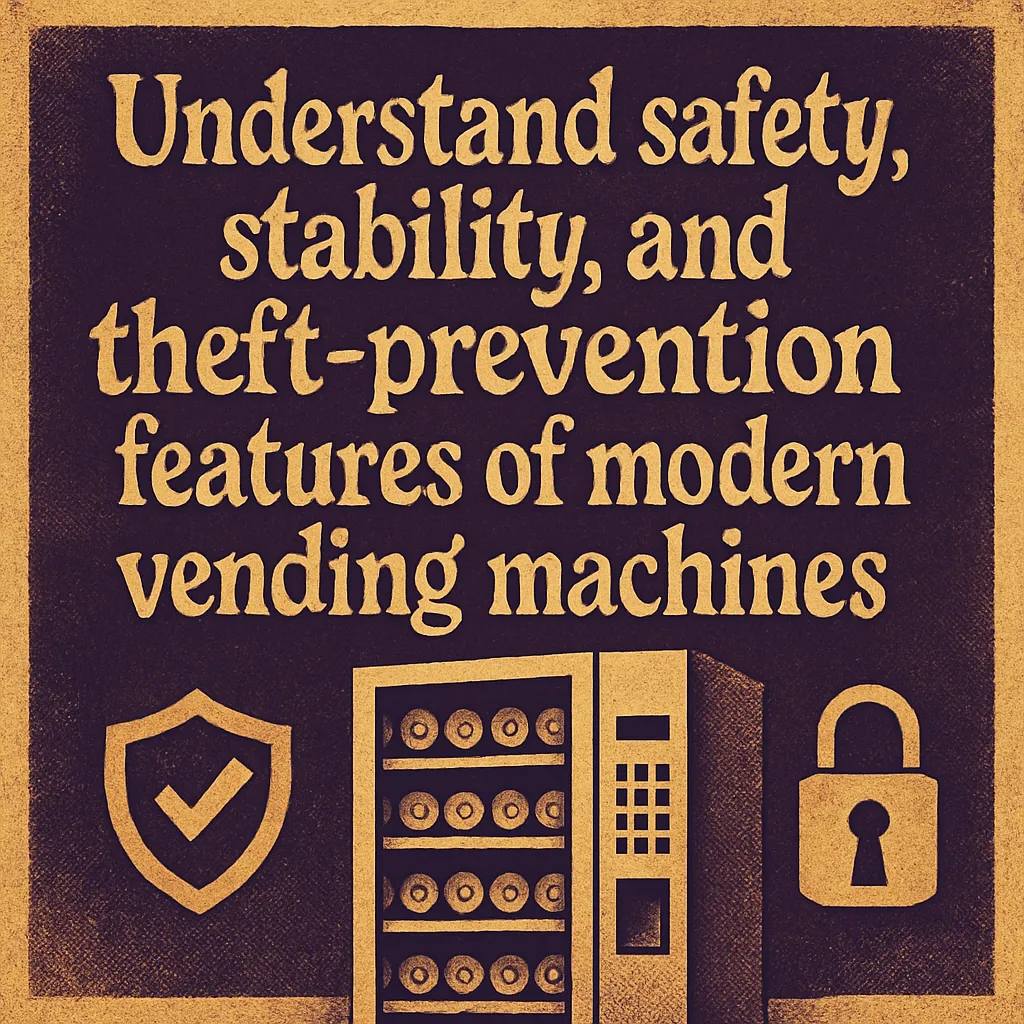Are Vending Machines Safe and Secure?
Understand safety, stability, and theft-prevention features of modern vending machines.
Back to Vending FAQs ResourcesUnderstand safety, stability, and theft-prevention features of modern vending machines.
Back to Vending FAQs ResourcesModern vending machines are engineered with multiple layers of safety and security, protecting both users and the products within. From robust physical designs to advanced payment encryption, current technology addresses common concerns.
![]() Anti-tip mechanisms and stable bases are standard safety features
Anti-tip mechanisms and stable bases are standard safety features
![]() Theft prevention includes reinforced casings and advanced locking systems
Theft prevention includes reinforced casings and advanced locking systems
![]() Cashless payment options offer encrypted and secure transaction processing
Cashless payment options offer encrypted and secure transaction processing

In today's fast-paced world, convenience is key, and vending machines deliver just that. But beyond the quick snack or refreshing drink, a critical question often arises: are vending machines safe and secure? The answer, for modern machines, is a resounding yes. Significant advancements have been made in design, technology, and operational practices to ensure both user safety and security against theft or tampering.
One of the primary concerns for any public-facing appliance is physical safety. Modern vending machines are built to rigorous standards, incorporating features that prevent accidents. This includes robust, weighty bases and anti-tip mechanisms that ensure stability, even in high-traffic areas. The materials used, such as shatter-resistant glass for product displays, further enhance safety, reducing the risk of injury from accidental impact.
Security measures have evolved considerably. Gone are the days when a simple lock offered minimal deterrence. Today's machines feature advanced locking systems, often multi-point or with electronic verification, making unauthorized access extremely difficult. Reinforced steel casings provide structural integrity against forced entry. For locations requiring higher security, optional additions like alarm systems, motion sensors, and integrated surveillance cameras can be employed. These features not only deter criminals but also aid in identifying perpetrators should an incident occur, providing peace of mind for site owners and operators. You can learn more about securing machines in public spaces within the guide on security for vending machines in public buildings.
With the rise of cashless payments, the security of financial transactions is paramount. Modern vending machines are equipped with encrypted card readers and mobile payment systems certified to industry standards. These systems protect sensitive data, mirroring the security protocols used in other retail environments. This means your credit card information or mobile payment details are encrypted and transmitted securely, significantly reducing the risk of data breaches. Understanding these technological advancements can help businesses confidently adopt cashless solutions, as detailed in our analysis of understanding vending machine technology.
Beyond physical and data security, product integrity is also a crucial aspect of safety. Refrigerated vending machines maintain precise temperature controls to ensure that perishable items like fresh food and dairy products remain safe for consumption. Operators adhere to strict stocking schedules, monitoring expiration dates and product turnover to guarantee freshness. This commitment to quality ensures that every purchase is safe and enjoyable. For facilities focused on healthier options, these controls are even more vital, as discussed for healthy vending in hospitals and healthcare.
Finally, safety also encompasses accessibility. Many vending machines are designed to be ADA compliant, featuring accessible payment interfaces, clear instructions, and product retrieval mechanisms positioned within reach for users with disabilities. This inclusive design ensures that everyone can safely and easily use the machines. From the fortified exterior to the encrypted interior, modern vending machines prioritize safety and security to deliver a reliable and convenient experience.
Yes, modern vending machines are designed with safety features like anti-tip mechanisms and shatter-resistant glass to prevent accidents during operation.
They often include robust locking mechanisms, reinforced casings, alarm systems, and sometimes even surveillance cameras or motion sensors to deter theft.
Machines with cashless payment options use encrypted card readers and mobile payment systems that secure your financial data, similar to other retail transactions.
Refrigerated machines maintain optimal temperatures for perishables, and operators regularly monitor stock and expiration dates to ensure product quality.
While vandalism can happen, machines in public areas often have sturdy construction and are placed in monitored locations to reduce the risk. Advanced models may have damage sensors.
No, reputable vending machines undergo rigorous safety testing and adhere to electrical and fire safety standards, making them very low risk.
Many modern machines are designed with ADA compliance in mind, featuring accessible payment interfaces and product retrieval heights for all users.
Most machines have sensors to detect malfunctions, like product drops, and can often refund money or log the issue for servicing. Contact information for support is usually displayed.
Installation and relocation should always be handled by trained professionals to ensure proper handling and secure placement, avoiding potential injury or damage.
Yes, vending machine operators and owners usually carry insurance that covers property damage, public liability, and sometimes even product liability, contributing to overall safety and security.